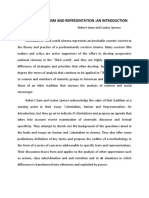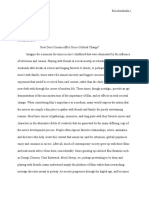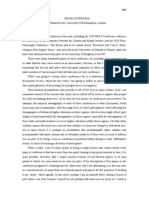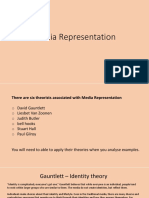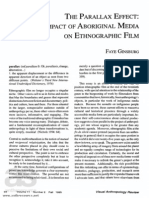Gilroy: Cinema
Gilroy: Cinema
Uploaded by
brtyCopyright:
Available Formats
Gilroy: Cinema
Gilroy: Cinema
Uploaded by
brtyOriginal Title
Copyright
Available Formats
Share this document
Did you find this document useful?
Is this content inappropriate?
Copyright:
Available Formats
Gilroy: Cinema
Gilroy: Cinema
Uploaded by
brtyCopyright:
Available Formats
Race and the Cinema: An Interview
with Stuart Hall and Paul Gilroy
Interviewed by Lizbeth Goodman
In this interview, Stuart Hall and Paul Gilroy are questioned by
Lizbeth Goodman about the immediate and projected long-term impact
of Spike Lee’s film Malcolm X.
Stuart Hall is Professor of Sociology at the Open University and the
well-known author of many articles on culture and society, including The
Hard Road to Renewal: Thatcherism and the Crisis of the Left (Verso,
1988). He is the former Director of the Centre for Contemporary
Cultural Studies at Birmingham University and is also known as an
expert on black cinema and as the presenter of the recent acclaimed tele-
vision series on Caribbean culture.
Paul Gilroy is Lecturer in Sociology at Goldsmith’s College, London,
and an expert on race relations. He is the author of the landmark book
on racism and national identities, There Ain’t No Black in the Union Jack
(Hutchinson, 1989). He has published widely on the subjects of media
studies, cultural studies, and race relations.
Lizbeth Goodman is Lecturer in Literature at the Open University
and the academic consultant and presenter of the BBC Radio Art Works
Series (1991-1993). She is the author of Contemporary Feminist Theatres
(Routledge, 1993) and co-editor of Imagining Women: Cultural Repre-
sentations and Gender (Polity Press, 1992).
Lizbeth: In this interview we’ll be discussing the film Malcolm X in
light of the recent recognition of black cinema as a form of representa-
tion of black people’s lives in an industry that has only recently and reluc-
tantly begun to let loose it’s grasp on the means of production.
Stuart, to begin with you, broadly speaking what relationship does race
or ethnicity or being black have to do with the media and the arts?
Direct correspondence to Lizbeth Goodman, Department of Literature, The Open
University, Walton Hall, Milton Keynes, England MK7 6AA. The interview was taped on
March 5, 1993, and broadcast on BBC Radio as part of the Open University-BBC Art
Works Series. Producer of the 1993 Art Works Series is Angela Jamieson. Production Assis-
tant is Judy Collins. The transcript was typed by Trish Lawrence.
Downloaded from crs.sagepub.com at The University of Iowa Libraries on June 5, 2016
108
Stuart: Well, I’d say that the media and the arts, film and television
particularly, are very important for circulating images and, to some
extent, stereotypes of race and race relations, of what the meaning of
ethnicity isin any society. In a sense, what the society knows about race
and what it feels about race do not exist outside of the way in which those
subjects are represented in the media. The media are indeed constitutive
of what we know and how we feel, indeed how we feel about ourselves,
and so I think that by looking at how race is surfacing and how it’s being
handled in the media at any particular time you do get a profound insight
into the shifting relations that are going on around race and ethnicity at
that moment.
Lizbeth: Right, and Paul, when we look at race relations we also look
at racism.You’ve argued in your book that &dquo;racism does not move tidily
and unchanged through time and history.&dquo; That is, racism takes different
forms in different cultures, situations, generations. What untidy form
does racism take today, not only in Britain but also in other cultures, for
instance the cultures that were dealt with in the film Malcolm X, includ-
ing the United States and South Africa?
Paul: Well, when we think about racism, we tend to think of race as a
biological category and I think one of the most important factors that we
have to face (and it’s a hard thing to face when we look at the different
patterns of racism found in the different places that you’ve mentioned) is
that in each of them, rather than investing heavily in the notion of
biology (which is still around but is not dominant), there is a peculiar and
intense investment in notions of culture, notions of identity.
Race becomes a matter of culture and identity. Racisms work to sepa-
rate racial groups through notions of culture that are thought to be
particular, thought to be absolutely different from one another, and that
lends cultural representation around race a very special character, partic-
ularly as the experience (political, economic, historical) of different black
populations in the world is becoming more internally differentiated, both
within the societies that you mention and between them. So the meaning
of being black in South Africa is not what it is to be black in Britain. The
meaning of being black in North America is not what it means to be black
in the South America. Not only are these new racisms focused by ques-
tions of culture and identity, but the fact that we now have to discuss
these racisms internationally, transnationally, interculturally, means that
we are dealing with a network of communication around race that has
become a global one. That, too, is something that is important to keep in
mind when we look at the film Malcolm X.
Lizbeth: So, really, it’s the media itself that is making these links
between cultures. We’re talking about individual forms of racism, racism
Downloaded from crs.sagepub.com at The University of Iowa Libraries on June 5, 2016
109
in individual societies, connected by representations in the media For
instance, this film makes a link between the LA riots and American
culture, and Soweto and the South African situation. This conversation
brings in the British context as well. Stuart, would you care to comment
on the multi-cultural implications here?
Stuart: Yes, just to say that you could think of the film Malcolm X as
circulating the signifier &dquo;Malcolm X&dquo; (whatever that stands for) through
these three quite different cultures, and, obviously, it’s going to be read
differently and it’s effect is going to be very different in each. What
Malcolm X might mean now in the current situation in South Africa is
very different from what it means in America with its long history of civil
rights and an experience of race and that’s very different from the
emerging forms of black, white, and other forms of ethnic relations in
Britain. So the same film will mean very different things, and it is in that
sense that the media form this kind of connection between these different
specific national situations.
Lizbeth: If we talk about the cinema specifically there’s no doubt that,
until recently, the few mainstream films that did represent black people
did not do so in any full or rounded or necessarily positive way. In the
film, Malcolm X described his own experience of being the only black
child in his school as an experience of seeming to be invisible. In a sense,
black experience has been invisible in much cinema until very recently.
I’d like to get both of your views, starting with Paul, why have there
been so few media representations of black experience?
Paul: I don’t know that I agree that there have been so few representa-
tions. I think that they are concentrated in particular places. What you
see now is the emergence of a visual culture around these issues, but
other media representations have existed in the past. For example, from
the days of slavery blacks have written and published literature, produc-
ing particular genres and traditions of writing, autobiography for exam-
ple. These cultural representations were widely circulated. There’s also a
tradition of music making, which has become a kind of global
phenomenon too. So what we are seeing now is a move away from a
culture based around print and around sound into a more elaborated
engagement with visual forms and with cinema in particular.
Lizbeth: Why, for instance, have we seen the work of more young
black film makers very recently?
Paul: Well, I think it’s got to do partly with patterns involved in
cinema attendance. Remember we are dealing here with a business and
one of the most interesting questions about the Malcolm X film is that it
Downloaded from crs.sagepub.com at The University of Iowa Libraries on June 5, 2016
110
raises the question of the commercialization and marketing issues that
surround and engulf the figure of Malcolm X. So we’re dealing with the
business at a time, perhaps, when cinema audiences in general are less
engaged by the project of going out into the public sphere to consume
these particular cultural products. Black audiences for interesting reasons
have become particularly attached to that idea of moving out into a
public space to cooperate together in the consumption of particular sets
of images, and I think that’s part of it.
Lizbeth: Stuart, would you agree?
Stuart: Yes, broadly I would. One has to remember that there have
always been black faces, even on film and television. Silent movies began
with representations of blacks in the South and British television had a
black song and dance team on the very first night of it’s transmission. So
it’s never been a question of absence. It’s been a question of how those
images surface and in what areas they surface. The movement is really
between different genres and between different situations, but I think
there is one shift that is very significant. I think we are now seeing more
direct access by young black film makers, cinematographers, directly to
the industry in a way that was much more policed and much, much less
easy at an earlier stage. I think that has to do with, among other things,
the centrality of questions of race and ethnicity to these societies. It’s just
impossible to write and think about British and American life any longer
without taking the question of race absolutely centrally to it, so the
coverage increasingly has been the coverage of those subjects. But I think
it also has to do with a certain creative confidence in that younger gener-
ation, which is at the moment very full of ideas and wanting to represent
themselves rather than be represented by somebody else. That has
pushed the industry to give black people, young people, slightly more
visibility than perhaps they had at an earlier stage.
Lizbeth: This whole issue of representation is interesting because
there is this assumption that one young black male film maker somehow
represents all black people.
Stuart: That is a problem for any creative black person in any medium,
because access to representation has been so restricted historically. Once
one person gets through the barrier they carry what we have to call the
&dquo;burden of black representation&dquo; - that anything they say or show or
visualize is taken to represent the whole attitude of a whole group that
itself is conceived of having a homogeneous culture, a homogeneous
outlook, as not being internally divided (like every group is) about its
political attitudes or social values or whatever it might be. And I think
this is one of the reasons why a lot of creative black artists and cultural
Downloaded from crs.sagepub.com at The University of Iowa Libraries on June 5, 2016
111
workers resist being taken as ethnically representative, as always having
to speak not in their own voice but on behalf of the entire race.
Lizbeth: When Boyz ’n the Hood was released, directed by John Single-
ton, another young black film maker, there were gang riots. I remember I
was in New York when the film was first released and the riots were not
so much to do with the difference between black and white audience
members as between local black gangs feeling differently represented or
unrepresented by situations in that film. This is in itself interesting and
leads me question Spike Lee’s role as ’representative’ of blacks, partly
because of the mainstream quality of this film, the major Hollywood
blockbuster style of the film. But Paul and Stuart, do you think that Spike
Lee sees himself as representative of black people, if you can use a broad
general label like that, or do you think he sees himself as representing
Spike Lee?
Paul: Well, I think there are two ways we can approach this. I think
personally he has a very ambivalent relationship to that role as a repre-
sentative. On the other hand, I think there is a specific question, a
tension if you like, which arises in the difference between representing
black people in general (which is an impossible demand) and represent-
ing African-Americans in general (which is also an impossible demand).
You mentioned the example of Boyz ’n the Hood. Boyz ’n the Hood seems
to me to represent, in part, a kind of narrative of class transition and
uplift. We find the respectable boy and respectable girl going off to
Atlanta, one to Spellman, one to Moorhouse, on opposite sides of the
road. That sort of recomposition of community as a narrative, a kind of
heterosexual coupling and class transition, is a very familiar American
pattern, a pattern of educational development and change that is also a
feature of the Malcolm X narrative.
Spike Lee in this film is trying, I think (and I wonder if this is success-
ful), to recompose that relationship between the particular African-
American narrative, the particular African-American focus on questions
of race and culture and identity, and the global issue that we raised
before. The film concludes with Nelson Mandela. Now I suppose I would
want to ask the question whether that link is made effectively, and it is an
important link, especially in this case because the narrative of Malcolm’s
own life is a narrative of crossing. Malcolm crosses the Atlantic from west
to east. He goes to Africa. He is changed by that journey. He goes to
Europe. He is changed again by that journey. So the issue of that tension
between the local, if you like, and the global elements of black culture is
raised directly in this narrative and it’s something that I feel isn’t resolved
comfortably because it’s so overdetermined by the grand story of African-
American exceptionalism that haunts the film from its opening sequence
Downloaded from crs.sagepub.com at The University of Iowa Libraries on June 5, 2016
112
where we see the American flag burning. The flag isn’t consumed, it’s
retained and reshaped into the configuration of an X.
Lizbeth: In minute I want to ask what that X means. But before we
a
move on, some people may not know the story of Malcolm X, so it might
be worth providing a bit of background information or context at this
point. Malcolm X (nee Malcolm Little) was born in 1925 in Omaha,
Nebraska. After a series of raids on his family’s home by the Ku Klux
Klan and the untimely death of his father, Malcolm and his brothers and
sisters were taken from their mother. Malcolm was raised in a series of
foster homes. He was exceptionally bright and did well in school but
learned in time that he would be judged by his color rather than his
personal achievements. He wanted to be a lawyer but was told that young
black boys didn’t grow up to be lawyers.
There’s a very powerful moment in the film where the teacher actually
tells Malcolm this in the classroom, and the way the scene is constructed
implies that this was a grand moment in Malcolm’s life, that it shaped his
view of what he was going to be. He’s told that he could be, for instance, a
carpenter instead. Malcolm went on a became a teenage hustler in
Boston and later in Harlem, going by the name of Red, and was impris-
oned later and known as Satan.
In prison he was introduced to Islamic doctrine and learned once again
to respect education, which seems to be a major theme in Malcolm’s life,
as well as in this film. He read and copied out the dictionary cover to
cover, thinking about the meaning of words as they’ve been recorded by
white men. When he was released from prison he became a Muslim
preacher, a public figure in the fight for civil rights, and then, knowing
that words had meanings and that his own name was not his own but
rather the surname of the white men who bought his ancestors in slavery,
he chose a new name for himself, the letter X.
In the film we are shown a clip from a talk show where Malcolm X
explains the significance of his chosen surname. Stuart, could I ask you to
comment, then, on the meaning of the X: why did Malcolm chose the
name X?
Stuart: Well, he chooses the name X because his own name, Little,
was the name that the slave holder had given to the slave and he’s picking
up there on the experience of Africans, which is that their names were
given to them, and they mark the loss of their own African and tribal
name, which of course they can’t any longer recover. I think what is inter-
esting about Malcolm X is the fact that he goes through several names.
He’s born as Malcolm Little; he is known as Detroit Red in his homeboy
phase; he takes on Malcolm X when he becomes converted to the nation
of Islam, and that signifies in a sense the generality of his own nameless-
ness and the site of the search for what his real identity can be once he
Downloaded from crs.sagepub.com at The University of Iowa Libraries on June 5, 2016
113
has refused the identity which has been given him by white American
society. So X, I think, marks the spot, as it were, where one identity is lost
and the search for another identity begins.
But of course, he doesn’t end there; he ends by taking his own Islamic
name and I think that underpins the point that Paul made earlier: the
striking thing about the Malcolm X story is not what is usually picked up
(namely, his intransigent opposition to white racism), but much more his
capacity inside that role to go on learning. This is a fantastic story of self-
education or self-transformation. Again and again he becomes another
person in the light of the conditions and circumstances to which he’s
exposed, and that’s marked by the continual shifting of his name. You
asked the question what does Malcolm X mean? Well Malcolm X now
means partly what Spike Lee has made him through the marketing that
we discussed before. But its meaning also depends on how that story is
going to be read by young blacks in the ghettos, in the inner cities, both in
America and in Britain, and differently in both places. This signifier will
be constantly re-read in terms of the circumstances that young people are
faced with today. I think it’s absurd to say what is now the &dquo;true&dquo; meaning
of Malcolm X, and I say that partly because I think the film is, in Spike
Lee’s usual didactic way, a sort of an attempt to say that this is what it
really should mean, what it should mean for now. The connections to
Mandela and the montage at the end, which is intended to give Malcolm
X a resonance in the contemporary setting, is obviously Spike Lee’s
desire to push the story into the 1990s, but if he thinks that he’ll fix it
there and that he’ll prevent its continually being re-read in Brixton and
elsewhere, he’s wrong.
Lizbeth: One of the important things about the film is not just its
success in mainstream terms, but the fact that it’s got the autobiography
of Malcolm X as told to Alex Haley back on the best-seller list. People
are reading Malcolm X’s life story again, at least in the States, or so the
media keeps telling us (whether or not that’s true is another question).
But it struck me again recently in New York seeing all the Malcolm X
tee-shirts and baseball caps and coffee mugs, primarily worn and held by
young white people, that the X has become a symbol for all kinds of
things, maybe for buying into political correctness without actually
knowing who the man is or what his significance was.
Paul:Well, I think I agree with Stuart about the power of the narrative
of change which the book and the film celebrate, and I think that that
image of change is something that is very, very powerful at a moment
where the drift of political life is so much towards flxity and stasis. That’s
part of what explains the enthusiasm the people have for the sign of X
because, in a sense, it’s a sign for that possibility of change. But an X is
also a cross, and I think that there is in the film - with the presentation
Downloaded from crs.sagepub.com at The University of Iowa Libraries on June 5, 2016
114
of Malcolm as a sort of Messiah, a Messiah who brings not only redemp-
tion but also retribution to America - a kind of reconciliation with some
very deep patterns in African-American culture, and literary expression
in particular, where the messianic figure has a very special force. When I
saw the film I was thinking a lot about Uncle Tom and the redemptive
power of Uncle Tom’s suffering. Perhaps there is some sense in which we
need to situate this narrative of Malcolm as a Messiah in a longer and
deeper structure of thinking about the redemptive power of suffering
itself, particularly the redemptive power of the suffering of heroic male
figures.
Stuart: Oh, you may have misunderstood
Paul when I said the
me
story of Malcolm X is the story of change. I story of his life; I
meant the
didn’t mean the film. I think the film is something slightly different. I
think the film does heroize the figure. I think the film belongs to a strand
which one can see in many other contemporary recent black American
films - namely, a sort of return to a very strict conception of black
masculinity. I know that it belongs in the culture of Islam and so there is
a rationale for it, but, nevertheless, I think the film adds to that and I
agree that the film Malcolm is a biopic in the classic sense. It’s a better
film than Ghandi, but it’s not a different film than Ghandi. At the center
of films like that is always the sacrificial figure. The closing three-quarters
of hour of the film, I think, moves for my taste too much in that direction.
Malcolm is almost blameless; he has almost become a kind of cypher
which is filled with our desire to find the perfect black hero. He’s
depicted as very much at rest, waiting for the what he knows is going to
come, a certain doom-laden unfolding of a narrative towards a closure
that I think is really the film’s reading of that life, not necessarily what
other people could get out of it (including, I would say, the autobiogra-
phy, which I think is more open in the different kind of readings that you
can make of it).
Lizbeth: It’s interesting what’s left in and what’s left out of the film,
not only from the autobiography, but also from the screenplay, which is
now published. This aspect of inclusion and exclusion as a deliberate
strategy is something you’ve both been mentioning. It’s a point about
emphasis. Spike Lee makes directorial artistic choices about emphases in
portraying Malcolm X as a Messiah or prophet or the importance of him
as a public political figure. All of that is emphasized. In my own opinion,
so is Spike Lee’s role as a Messiah; there’s certainly a parallel set up by
Lee himself as a bringer of the word about Malcolm X. But quite apart
from that, there are other scenes that reveal something about Lee’s mind-
set, as well as Malcolm’s. For instance, to take an obvious example, there
is the controversial scene wherein the young white &dquo;politically correct&dquo;
woman walks up to Malcolm X as he’s on his way to a lecture. She asks
Downloaded from crs.sagepub.com at The University of Iowa Libraries on June 5, 2016
115
what she can do to help the civil rights cause. He says &dquo;nothing.&dquo; It’s a
much talked about scene in the film, and what’s interesting about it is
that this scene is included in the film, but the scene from later life when
Malcolm X declares that he has changed his position, that he does think
white people can help in some way, is not included in Lee’s film. Why do
you think that scene wasn’t included, Paul?
Paul: Well, I think that there is a kind of popular cast of mind in
thinking about the politics of race and the resistance to racism that tends
to divide up the political moment of that conflict in a way that accentu-
ates its binary character: you are either a victim of racism or you’re a
perpetrator, and at that moment the possibility of active agency against
racism gets lost. Now I think it’s very significant that in the film the idea
of what we might call an anti-racist position, a third position - neither a
victim nor a perpetrator - is erased. I think for me that’s one of the ways
in which the film emphasizes its very anti-political cast of mind. In the
way in which it reconstructs Malcolm’s life, the film is much more
comfortable with the Malcolm who looks at the march on Washington
from the sidelines, much more comfortable with the Malcolm who
doesn’t demand integration actually, and I think there are a number of
ways in which the film is uncomfortable with the transition from an anti-
political position to a political one. It is significant also that, when the
political moment comes in the coda at the end of the film with Nelson
Mandela, the film steps outside of America and is relocated in the politi-
cal moment in South Africa.
Lizbeth: Which is intriguing given that in Do the Right Thing the coda
is the contrast between Martin Luther King and Malcolm X. Speaking
from my own experience of childhood in the United States, those were
the two figures often contrasted by the white media. Martin Luther King
was the good guy and Malcolm X was the bad guy. That was the message
that was put across for many years. I think it’s significant that Spike Lee
has picked up on that contrast in earlier films and refers to it in the book
about the making of the film, but Martin Luther King is not a very visible
figure in this film at all. It’s almost as if that contrast has begun to be lost
and Malcolm X is now the really central figure, with Spike Lee himself
coming into focus as well.
Stuart: Well, I think the point you are making is an interesting one
because the end of Do the Right Thing, with the unresolved contrast
between Malcolm and Martin, is a very memorable one. I think that the
meaning of that ending has been waiting for Spike’s next indication of
how this is to be resolved. And the problem is that it’s there in the film,
but it’s not actually addressed. That is to say, the complex relationship
that Malcolm had towards the King-inspired civil rights movement -
Downloaded from crs.sagepub.com at The University of Iowa Libraries on June 5, 2016
116
which, in fact, he changes his mind on, as he changes his mind on many
other things - that evolution is not taken in such a way as to enable us to
re-read the previous political positions from it. So I think what Paul is
saying is right that, in spite of the fact that the film is quite accurate about
the shifts in Malcolm’s position, it nevertheless does have a private priv-
ileging of a more simple binarist moment.
That remains the key moment and Malcolm (I think if one reads the
whole life rather than just one moment in it) will always be subversive or
undermining in relation to dividing the racial situation into those simple
polarizations. Nobody knows why Lee left out the scene (which is also
authentic) where Malcolm says he was sorry about what he said to the
woman who asked him what can whites do for the struggle. Now that may
just have been a matter of cutting. I don’t think one should read too
much into that, but that scene in itself is very complex because many
white people who came into contact with Malcolm always commented on
his dignity, his personal courtesy towards them, so one has to be careful
not to misinterpret what he is saying there. It’s a comment about white
racism and about the position of people in a system who think they can
simply, as it were, float across the line and join up. But that’s not an easy
form of politics to undertake. That’s what the statement means. It doesn’t
mean that because you’ve got white blood in your genes you can never
contribute to the good things that all blacks with black blood in their
genes can do politically. I don’t think Malcolm ever, even in his most
binarist moment, was ever into politics of that kind.
Paul: But that is the politics of the nation of Islam.
Stuart: That is of course the politics of the nation of Islam, and it’s
also why I think some people are reading the story from that moment
because they want to go back to the security of a politics that can be
grand. I think that’s what Paul meant by a non-political moment, not that
there’s no politics in it but that the politics have been abstracted from it
because it doesn’t require thinking about positions and alliances and
movements and agencies; it’s somehow given by the color of your skin.
Lizbeth: There’s another point in the Malcolm X story and in the film
where Malcolm X changes his mind. I want to talk about that for a
minute because we’re talking about the issue of white responsibility for
black oppression, whether or not whites can help in the struggle, which
seems to me like quite a parallel situation to the continuing question of
whether men can help in the feminist struggle (the old debate about
whether men can be called &dquo;feminist&dquo; or &dquo;pro-feminist&dquo;). It’s a very
different scenario but a similar structuring of the issue of responsibility
and inclusion in a struggle. This whole complex interplay of guilt and
anger surfaces on both sides when the issue is race relations. So when
Downloaded from crs.sagepub.com at The University of Iowa Libraries on June 5, 2016
117
Malcolm X returned from his pilgrimage to Mecca, he had changed his
view on these issues to some extent but not entirely. At this point in the
film Malcolm says:
Now you may be shocked by these words but I have eaten from
the same plate, drunk from the same glass, and prayed to the same
god with fellow Muslims whose eyes were blue, whose hair was
blonde and whose skin was the whitest of white and we were all
brothers, true. People of all colors and races believing in one god
and one humanity.
Each hour here in this sacred land enables me to have a greater
spiritual insight into what is happening in America. The American
negro can never be blamed for his racial animosities. He is only
reacting to four hundred years of oppression and discrimination.
But as racism leads America up the suicidal path, I do believe that
the younger generation will see the handwriting on the wall and
many of them will want to turn to the spiritual path of the truth: the
only way left in this world to ward off the disaster that racism must
surely lead to.
That extract was taken from the part in the film where Malcolm has
written home to his wife Betty. He’s describing his pilgrimage. There’s
another scene later in the film when he’s interviewed in the airport - a
similar scene where he’s also talking about what’s basically a change of
his views from his earlier statements. So, to start with you Paul, what’s
going on there? What’s the significance of that change?
Paul: Well, I would see that change very much as an example of where,
as Malcolm himself states, the kind of local habits and strategies, the ways
in which racial difference and racial conflict have been fought in the
American context become unravelled, become rather arbitrary looking
when placed in a global context. What’s being negotiated there is the
relationship between the particular history of black Americans and the
history of blacks in the world. Malcolm’s sense of political strategy, of
how to place himself, is transformed by being in Africa, by interacting
with African politicians, by thinking about the possibility (as a number of
other black intellectuals in the world were doing at this time) of linking
the struggles of African-American people for human rights, for civil
rights, political rights, with anti-imperialist activity, with movements
against colonialism in other parts of the world. So I think that’s what’s
being worked through in that shift.
Stuart: And I would add that, just as I think it’s wrong to read the
earlier moment where he says to the woman that whites can do &dquo;nothing&dquo;
for the struggle as a personal rather than a political statement, so I think
Downloaded from crs.sagepub.com at The University of Iowa Libraries on June 5, 2016
118
it’s wrong to read this later moment as guaranteeing an easy absolution.
He’s not saying, well, it’s all alright, we can all be one happy family and
you can just forget what has happened. What has happened in the partic-
ular context of relations between blacks and whites in America through
slavery and afterwards remains the case. What Malcolm is talking about is
the politics of that situation, and the politics one can make of that situa-
tion remain the politics of struggle, but it’s not a struggle that can be
separated into black and white as two all-embracing simple categories.
Lizbeth: To continue from that then, we’ve got a film that begins with
the LA riots, scenes from the Rodney King incident on tape, the burning
of the flag, which, as Paul described earlier, becomes the X. Several times
throughout the film we’ve got footage of John F. Kennedy’s assassination,
and some kind of a parallel is being set up there as well. JFK almost
becomes the white version of Malcolm X in some strange kind of way.
And then, at the end of the film, we’ve got shots of street protests in
Soweto and a lecture delivered by Nelson Mandela himself. It’s delivered
to a room full of schoolchildren, but, because of the camera angle, also to
us, the audience, positioning us as students being lectured in quite a
polemical style. What do you think is the point of that montage?
Stuart: Well, I think I know what the point is. I think the point of the
scene at the end is to try to give the Malcolm X story a much wider, more
international resonance of meaning, and I don’t think there’s anything
wrong with that, but I don’t think it works filmically. It feels very didactic.
I think didacticism is a problem in a lot of Spike Lee’s films, and he also
has difficulty in finding endings for his work. I don’t think the conclusions
to any of his films quite work and didacticism is one of the things that he
reaches for at the end as a way of bringing about a closure that isn’t
growing organically out of the film that he’s set up. Remember the shout
at the end of School Days: &dquo;No! No! No! Help! Help! Help!&dquo; or whatever
it says. I think there are real problems about trying to realize those
connections. The connections were there because, precisely as Paul is
suggesting, what the meaning of the trip to Mecca is for Malcolm is to
suddenly see the African-American struggle in a different context. But
just wheeling in Mandela to speak, as it were, out of nowhere - it really
has no grounding in the film itself.
Paul: Well, I agree with that, but I think the way in which its grounded
in the film is through the construction of masculinity. Masculinity is the
conduit for that articulation, conveyed in what Nelson Mandela actually
says. He says, &dquo;the struggle to be a man, the struggle to be a human
being,&dquo; and it’s just a shame that in a Spike Lee movie those two terms
aren’t reversed. You listen to that and there is always going to be, it
seems, a priority to being a man rather being a human being, and I felt
Downloaded from crs.sagepub.com at The University of Iowa Libraries on June 5, 2016
119
greatly saddened that Nelson Mandela had been roped into endorsing
that particular priority.
Lizbeth: Again, this is to do with emphasis. It’s difficult not to notice
the emphasis on a particular representation of masculinity in this and
other Spike Lee films. That emphasis must say something about Lee’s
own views. It’s one thing to say we can’t really criticize Malcolm X’s view
of women or the Islamic view of women (or we can but it’s not really rele-
vant to this film), but Spike Lee’s own views of women or of Islamic
society or of race relations are relevant here.
Paul: I think that’s right, and I think that the scene in the film where
Malcolm and Betty are arguing is something that doesn’t appear in the
book, in the autobiography, in the same way. It’s clearly something that
Spike Lee has felt it’s important to bring into the film from his own
preoccupations. There are a number of things like that, but for me that
was one of the more glaring instances of that kind of importation.
Stuart: Though it’s almost a cliche to say so now, I think one does
have to say again and again that the question of sexuality and gender in
Spike Lee’s films has been problematic from the very beginning, from
She’s Gotta Have It onwards. And it’s operating at some very profound
level because, as you know, he’s received criticism, he’s responded to it,
but he keeps going back to it remorselessly. I think that Jungle Fever is, in
a sense, an advance on an untenable position rather than any attempt to
rework it in a more interesting way. And I think it’s interesting that in
Malcolm X - which isn’t centrally about that issue - nevertheless the
questions of masculinity and the way in which masculinity and femininity
are represented is one of the main ways in which the meanings of the film
continue to be carried. So I do think you’re right in saying that that’s not
just his being faithful to what he thinks of as Islam’s view of women. If
that’s so, you ought to feel that distancing between the film maker’s view
and what is being represented, but you don’t feel that.
Lizbeth: What about the other sort of common criticism of Lee’s work
(particularly with this film because it was so expensive to make, and Lee
went to well known African-American public figures to get some of the
sponsorship): the criticism is that he ’sold out’ to the mainstream and not
only that he no longer represents young black film makers but also that
somehow he sold out from his original position, which was meant to be
daringly alternative, or so we were meant to believe.
Paul: Well, here’s the narrative of somebody who moves from being an
independent film maker to being a Hollywood film maker, and I think
some of the more successful parts of the film are its grand Hollywood
Downloaded from crs.sagepub.com at The University of Iowa Libraries on June 5, 2016
120
gestures. I don’t think that is illegitimate. What’s more interesting to me
is how we read the politics of race and representation through the idea
that you either sell out or are faithful to something that’s fixed and noble.
Spike Lee’s career defies that.
Stuart: That movement is bound to be a question or a problem for any
black film maker or creative person. I think it’s too simplistic to apply the
criteria of authentic versus alternative or mainstream versus selling out. I
think it’s important that people do contest the mainstream of Hollywood
film making and try to influence it, because much of what we know about
race relations is coming precisely from the limited stereotypes and fixities
that one’s seeing represented in the mainstream. I don’t hold that against
the film, but I do think there are costs. The film Malcolm X is more
important as what I would call a cinematic political gesture or lesson than
it is as a film. It’s not even as interesting a film as some of Spike Lee’s
other films. I think it is cast very much in the conventional Hollywood
genre of the biopic. Some parts of that I like. The early parts of the film
in which there’s a wonderful dance sequence, which doesn’t really belong
anywhere, reminds one that Spike Lee could choreograph a really inter-
esting black musical. So, I think this is too simple a judgment of the
movement from alternative right-on film maker into the Hollywood
mainstream. Malcolm X will have some of the consequences and effects
that only mainstream film making can have, in the same way as Roots, for
instance, would not be thought of as being a creatively and televisually
novel and innovative form. But its historical impact, if you ask the
numbers of people in America and in this country who were really
changed and shaken by seeing Roots, was immense. This may also be true
of Malcolm X. This film, although not a great film, may have (perhaps in
ways we can’t predict) a very substantial political impact. But I think
there are other films to make about Malcolm X, films that don’t just go
through the chronological shifts but which actually look at some of the
complexities and contradictions of that process, which explore the moti-
vation of those movements from one stage to another in his life, but such
films probably can’t be made at this moment in the Hollywood main-
stream.
Downloaded from crs.sagepub.com at The University of Iowa Libraries on June 5, 2016
You might also like
- Kipnis, Laura - Bound and Gagged - Pornography and The Politics of Fantasy in America-Duke University Press (1999)Document241 pagesKipnis, Laura - Bound and Gagged - Pornography and The Politics of Fantasy in America-Duke University Press (1999)piss simulator100% (1)
- Constructing Celluloid GypsiesDocument14 pagesConstructing Celluloid GypsiesNikolinaDobrevaNo ratings yet
- Popular Culture: From John Storey's Popular Cuture and Cultural TheoryDocument29 pagesPopular Culture: From John Storey's Popular Cuture and Cultural TheoryUsha RajaramNo ratings yet
- Apple Math LessonDocument12 pagesApple Math Lessonapi-495904597No ratings yet
- Homosexuality As Dissent Cinema As Subversion Articulating Gay Consciousness in The PhilippinesDocument7 pagesHomosexuality As Dissent Cinema As Subversion Articulating Gay Consciousness in The PhilippinesChocoCath Enriquez100% (1)
- Alison Butler - Womens Cinema The Contested ScreenDocument147 pagesAlison Butler - Womens Cinema The Contested ScreenNaa Peru Sreenivas100% (1)
- West - Black Postmodern PracticesDocument3 pagesWest - Black Postmodern PracticesGray FisherNo ratings yet
- Mercer - Dark and Lovely TooDocument10 pagesMercer - Dark and Lovely TooGlauco FerreiraNo ratings yet
- The Cowboy Comes Out of The Closetquestions On SexualityDocument104 pagesThe Cowboy Comes Out of The Closetquestions On SexualityFrancimar OliveiraNo ratings yet
- Stereotype, Realism and Struggle Over Representation HandoutsDocument7 pagesStereotype, Realism and Struggle Over Representation Handoutsxeno_saitoNo ratings yet
- Todd Boyd - African Americans and Popular Culture (3 Vol Set) (2008, Praeger)Document834 pagesTodd Boyd - African Americans and Popular Culture (3 Vol Set) (2008, Praeger)Gabriel Viana SilveiraNo ratings yet
- (Critical Studies of Education 4) George J. Sefa Dei (Auth.) - Reframing Blackness and Black Solidarities Through Anti-Colonial and Decolonial Prisms-Springer International Publishing (2017)Document231 pages(Critical Studies of Education 4) George J. Sefa Dei (Auth.) - Reframing Blackness and Black Solidarities Through Anti-Colonial and Decolonial Prisms-Springer International Publishing (2017)Anonymous FG8AkB100% (1)
- What Is Strategic ThinkingDocument6 pagesWhat Is Strategic ThinkingMarco AlvarezNo ratings yet
- Colonialism, Racism and Representation:An IntroductionDocument7 pagesColonialism, Racism and Representation:An Introductionmahina kpNo ratings yet
- Jun Zubillaga-Pow - Trans-Aesthetics - The Art of Ming Wong Between Nation and StateDocument10 pagesJun Zubillaga-Pow - Trans-Aesthetics - The Art of Ming Wong Between Nation and StatejuguerrNo ratings yet
- Slumdog Millionaire and The Troubled Place of Cinema and NationDocument9 pagesSlumdog Millionaire and The Troubled Place of Cinema and Nationaniket mitraNo ratings yet
- Module 4Document18 pagesModule 4expertcomputer514No ratings yet
- URBN Final PaperDocument24 pagesURBN Final PapercynthiazorNo ratings yet
- Beyond The Chinese Connection: Contemporary Afro-Asian Cultural ProductionFrom EverandBeyond The Chinese Connection: Contemporary Afro-Asian Cultural ProductionNo ratings yet
- Chapter 10 Popular Culture & ICDocument8 pagesChapter 10 Popular Culture & ICAdelinaHocaNo ratings yet
- MIT Week 9 Privilege: Representation: Gender, Sexuality, ClassDocument3 pagesMIT Week 9 Privilege: Representation: Gender, Sexuality, ClassMar JoNo ratings yet
- I Am Who I Am'': Black Masculinity and The Interpretation of Individualism in The Film BarbershopDocument16 pagesI Am Who I Am'': Black Masculinity and The Interpretation of Individualism in The Film BarbershopashrafalhabsyNo ratings yet
- Media Representation of Minority Groups EditedDocument5 pagesMedia Representation of Minority Groups EditedjulietmbayajiNo ratings yet
- A Comparative Study On The Depiction of racism:BlacK Klansman, A Memoir by Ron Stallworth and BlacKkKlansman The Movie by Spike LeeDocument49 pagesA Comparative Study On The Depiction of racism:BlacK Klansman, A Memoir by Ron Stallworth and BlacKkKlansman The Movie by Spike LeeFathima FrancisNo ratings yet
- Essay of City LifeDocument4 pagesEssay of City Lifeezmsdedp100% (2)
- Popular Culture Reflects SocietyDocument8 pagesPopular Culture Reflects SocietyMutisya JeffreyNo ratings yet
- Stuart Halles SayDocument4 pagesStuart Halles Saysakura.heemavariNo ratings yet
- 5324-Cinema Studies Doesnt MatterDocument10 pages5324-Cinema Studies Doesnt MatterJokei SonyaNo ratings yet
- Dissertation Topics RacismDocument7 pagesDissertation Topics RacismWriteMyPaperCoAtlanta100% (1)
- Folkbildnigsterror - An Introduction - Atlanta Ina Beyer PDFDocument4 pagesFolkbildnigsterror - An Introduction - Atlanta Ina Beyer PDFAtlanta AthensNo ratings yet
- Globalized Arts: The Entertainment Economy and Cultural IdentityFrom EverandGlobalized Arts: The Entertainment Economy and Cultural IdentityNo ratings yet
- Demographic Angst: Cultural Narratives and American Films of the 1950sFrom EverandDemographic Angst: Cultural Narratives and American Films of the 1950sNo ratings yet
- Representation of EthnicityDocument49 pagesRepresentation of Ethnicityapi-224303452No ratings yet
- Old A Grade Essays On Collective IdentityDocument10 pagesOld A Grade Essays On Collective IdentitykatrinabrookesNo ratings yet
- Howard Winant InterviewDocument3 pagesHoward Winant InterviewNorton SociologyNo ratings yet
- Hall, Stuart - What Is This 'Black' in Black Popular CultureDocument12 pagesHall, Stuart - What Is This 'Black' in Black Popular CultureEdsonCosta87No ratings yet
- Cultural Studies for Troubling Times: A Multimodal Introduction to British and American CulturesFrom EverandCultural Studies for Troubling Times: A Multimodal Introduction to British and American CulturesHuck ChristianNo ratings yet
- ResearchessayDocument13 pagesResearchessayapi-549221094No ratings yet
- Critically Analyse A Specific Media Text (E.G. Film, TV Show, Series Episode) With Regards To Representations of Race, Gender, ClassDocument8 pagesCritically Analyse A Specific Media Text (E.G. Film, TV Show, Series Episode) With Regards To Representations of Race, Gender, ClassAngela TsilidiNo ratings yet
- Do You Think That Films Are A Mirror of A SocietyDocument5 pagesDo You Think That Films Are A Mirror of A SocietyManjari SardaNo ratings yet
- Empowering Voices: Documentary Filmmaking and Cultural Narratives: Black Media and Independent Filmmaking©Book Series, #3From EverandEmpowering Voices: Documentary Filmmaking and Cultural Narratives: Black Media and Independent Filmmaking©Book Series, #3No ratings yet
- Clampdown: Pop-Cultural Wars on Class and GenderFrom EverandClampdown: Pop-Cultural Wars on Class and GenderRating: 3 out of 5 stars3/5 (4)
- Brown - GenologophobiaDocument6 pagesBrown - GenologophobiawjrcbrownNo ratings yet
- Exam TOC - Readings and Concepts (1) - 33-41Document9 pagesExam TOC - Readings and Concepts (1) - 33-41Nil DelgadoNo ratings yet
- Media RepresentationDocument15 pagesMedia Representationapi-425581948No ratings yet
- Roll Up Your SleevesDocument8 pagesRoll Up Your SleevesZiyi YangNo ratings yet
- Ginsburg - The Parallax EffectDocument13 pagesGinsburg - The Parallax EffectChynna CarlosNo ratings yet
- Pop Music EssayDocument4 pagesPop Music Essayezmsdedp100% (2)
- Rabbit Proof Fence EssayDocument7 pagesRabbit Proof Fence Essayb725c62j100% (2)
- Ch. 6Document19 pagesCh. 6melody.elizabeth.14No ratings yet
- Savage Anxieties: The Invention of Western CivilizationFrom EverandSavage Anxieties: The Invention of Western CivilizationRating: 3.5 out of 5 stars3.5/5 (8)
- Youth CultureDocument239 pagesYouth CultureRuxandra Dumitru100% (3)
- TERRY, John Robert. Towards The Gendering of Blaxploitation and Black PowerDocument28 pagesTERRY, John Robert. Towards The Gendering of Blaxploitation and Black PowerStefany SohnNo ratings yet
- Personal TitleDocument5 pagesPersonal Titleapi-287839481No ratings yet
- NOTES of PHYSICS Class 11 Units and DimensionDocument6 pagesNOTES of PHYSICS Class 11 Units and DimensionYash MahantNo ratings yet
- Integration of Sound Signature in Graphical Password Authentication SystemDocument4 pagesIntegration of Sound Signature in Graphical Password Authentication SystemRAJESH BHATTNo ratings yet
- NMKD đề ônDocument10 pagesNMKD đề ônPhương HoàiNo ratings yet
- 26 49 2 PB With Cover PageDocument13 pages26 49 2 PB With Cover PageDianNo ratings yet
- Biofuels PresentationDocument9 pagesBiofuels Presentationronald100% (1)
- Snowflake Fundamentals Anand JhaDocument50 pagesSnowflake Fundamentals Anand Jhasomu kNo ratings yet
- CHE3044F, 2013: Reactor Design 1: TUTORIAL 2Document2 pagesCHE3044F, 2013: Reactor Design 1: TUTORIAL 2nmhatityeNo ratings yet
- Joseph GuidelinesDocument3 pagesJoseph GuidelinesRogue31179No ratings yet
- Final Notes NCM 100Document4 pagesFinal Notes NCM 100Jasmin CubillasNo ratings yet
- Let Reviewer For Biological Science Specialization Practice Test - Set 12Document3 pagesLet Reviewer For Biological Science Specialization Practice Test - Set 12Camille ManaloNo ratings yet
- AZ-500 Exam - Free Actual Q&as, Page 2 - ExamTopicsDocument6 pagesAZ-500 Exam - Free Actual Q&as, Page 2 - ExamTopicscotit93331No ratings yet
- Drawing Printout - How To Draw Chibi GirlsDocument5 pagesDrawing Printout - How To Draw Chibi Girlssteve johnNo ratings yet
- SDS Hand Gel SanitizerDocument6 pagesSDS Hand Gel SanitizerHayu Atuh 1No ratings yet
- Piper BetleDocument6 pagesPiper BetleNyayu_Fitriani100% (1)
- A Synthesis of Ian StewartDocument6 pagesA Synthesis of Ian StewartAngel FermalanNo ratings yet
- Cmcsis DSP CcsDocument30 pagesCmcsis DSP CcsAdemário carvalhoNo ratings yet
- Tarea 1Document11 pagesTarea 1Vladimir KijimaNo ratings yet
- What Is The Assessment Based National Dialogue (ABND) and How It WorksDocument30 pagesWhat Is The Assessment Based National Dialogue (ABND) and How It WorksAdithyaNo ratings yet
- 3rd Revision Economics EM 12th 2023Document2 pages3rd Revision Economics EM 12th 2023Rani muthuselvamNo ratings yet
- 1-Introduction To EpidemiologyDocument22 pages1-Introduction To EpidemiologyANTHONY KHAOYANo ratings yet
- Policy: PrisonDocument0 pagesPolicy: PrisondubstepperNo ratings yet
- Optical Properties of MaterialsDocument33 pagesOptical Properties of MaterialsHoang Hop Dang100% (1)
- ORTIZ - AMAZING - (M2 Lesson 2 - Types of Sources - While-Task 2)Document2 pagesORTIZ - AMAZING - (M2 Lesson 2 - Types of Sources - While-Task 2)ace starNo ratings yet
- Ramaswami 02 Yoga Sutra PDFDocument4 pagesRamaswami 02 Yoga Sutra PDFRodrigo Alonso Garrido StuardoNo ratings yet
- Pksoldier SaftyDocument4 pagesPksoldier Saftypratima yadavNo ratings yet
- SA2 GR 8Document1 pageSA2 GR 8Aiman AnsariNo ratings yet
- List of RFI Raised As On 16.08.2020Document2 pagesList of RFI Raised As On 16.08.2020Abhinandan MazumderNo ratings yet
- Horizontal & Vertical Structure For Work Organization: Kukuh Faedlur Rahman 14522125Document4 pagesHorizontal & Vertical Structure For Work Organization: Kukuh Faedlur Rahman 14522125kukuhricardoNo ratings yet



















